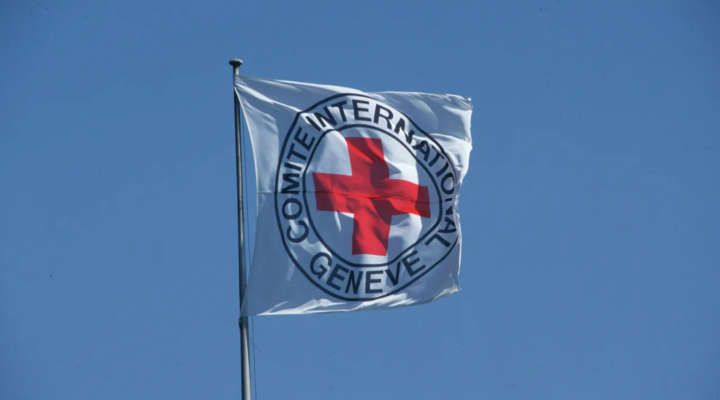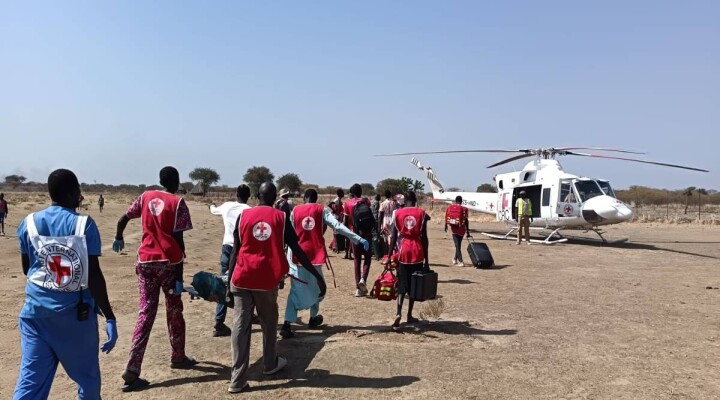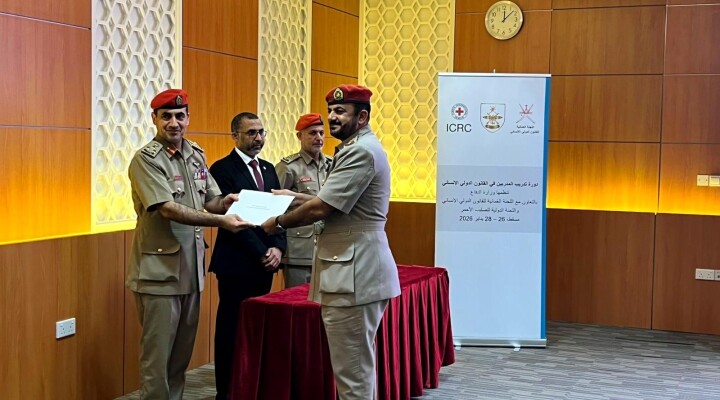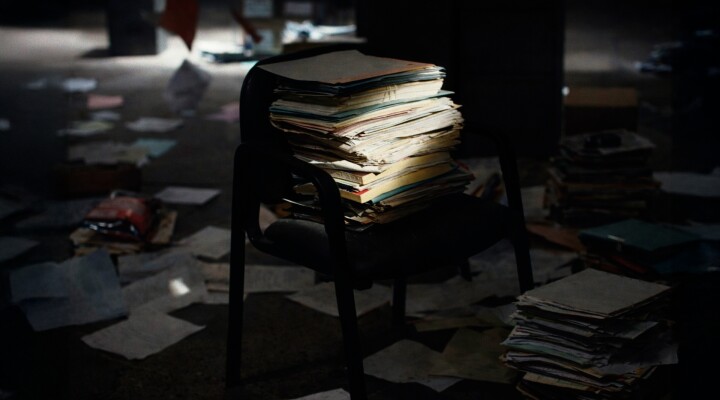Philippines: When there are no answers, families remember missing loved ones in Marawi, four years on from the fighting
In Marawi City, Lanao del Sur province in Mindanao, southern Philippines, dozens of families are still unaware of the fate of loved ones who disappeared in the five-month armed conflict that started on 23 May 2017.
“Life goes on. Four years has passed and it’s still hard to accept (what happened),” said 26-year-old *Joel, whose father, a construction worker, remains missing.
“I thank him for raising us well. For instilling in us not to break the law. I just miss him so much because he was my guide (in life),” he shared while getting emotional.
Beyond the psychological pain of not knowing what has happened to their loved ones, families of missing have economic, legal, and psychosocial needs. Many have lost their breadwinners and face legal and administrative gaps that limit their access to social benefits and pensions.
The International Committee of the Red Cross (ICRC), which has been supporting families of missing persons since the siege, conducted an assessment in 2019 to evaluate these needs following the disappearance. It showed that families’ top priority was to clarify the fate and whereabouts of their loved ones, followed by financial aid; and addressing the psychosocial challenges they face in dealing with absence.
Based on this assessment, the ICRC designed an accompaniment program that began in June 2020 to help meet these families’ needs. The main goal of accompaniment is to strengthen the abilities of individuals and families to deal with difficulties related to the disappearance of their relatives and to eventually resume their social lives. They can do this by maximizing their own resources and those available in the community and by creating a support network.
“Accompaniers” who have experienced the loss of a loved one were trained to set up peer-support groups of 6-8 people from the same area. They met twice a month wearing masks in well-ventilated settings, with respect to COVID-19 protocols, in a span of six months. In these sessions, facilitators taught participants better ways of coping and managing stress. The participants shared their emotions, daily struggles, and positive memories of the missing loved ones, as well as their own roles and the changes they faced after the disappearance.
“Having others experiencing this situation is important for healing. We are not promoting forgetting. We are helping them to learn to live with the ambiguity and create a new hope and meaning in life,” said Sherzod Musrifshoev, ICRC mental and psychosocial support delegate based in Iligan City.
The cycle of group sessions comprises of nine psychological and psychosocial support sessions. When the cycle is completed, families also benefit from 2-3 information sessions that tackle health or legal matters. In its fifth session, families bring their missing relatives’ favorite food or items and share with the group the memories attached to them. This is followed by a group commemoration, an activity to represent their missing loved ones. Participants choose the project and design the implementation themselves, while the ICRC provides them monetary support for the needed materials.
One group decided to plant 45 mahogany trees to symbolize their missing relatives’ presence, while families in Libertad, Misamis Oriental, built a waiting shed and a heart-shaped memorial signage to remember missing loved ones.
“When the accompaniment program concludes, we plan to still gather during special occasions related to our missing loved ones such as birthdays. The heart (signage) symbolizes our love, care, and honor and our respect to our families who disappeared during the Marawi siege,” said *Melissa, an “accompanier” from Libertad, Misamis Oriental, whose husband and son remain missing.
The ICRC’s accompaniment program continues to date, expanding to the areas of Zamboanga and Cotabato cities in Mindanao where some families of missing persons live.
For them, time does not heal, answers do. The active search for missing loved ones can continue for decades because the uncertainty of whether a loved one is alive or dead is unbearable and does not allow families to stop searching until they know.
Hundreds of thousands of people are missing around the world as a result of armed conflict, violence, migration and natural disasters. Some go missing in action. Some are forcibly disappeared. Each year, thousands lose contact with their loved ones as they flee violence or seek a better life elsewhere. Many never return and are never heard from again. This represents a global humanitarian tragedy on a large scale.
As of today, more than 145,000 persons are registered as missing by their families with the ICRC, and new cases are added every day. Far more people are missing and are not registered. It also only reveals part of the tragedy, as behind every missing person there are countless more people affected.
*not their real names
For further information, please contact:
Amer Hassan Sanggacala (in Iligan), mobile: +63 917 321 5787
Allison Lopez (in Manila), mobile: +63 908 868 6884
Follow ICRC Philippines on facebook.com/ICRCph/
LOGLIST
Location: Marawi and Iligan cities; and Misamis Oriental, Mindanao, Philippines
Date of filming: 17-18 May 2021
Length: 14:06
On-screen credit: International Committee of the Red Cross (ICRC)
Copyright: ICRC
*not their real names
*Joel, 26, a construction worker whose 62-year-old father went missing, from Libertad, Misamis Oriental
00:01-00:10 - Life goes on. Four years has passed and it’s still hard to accept (what happened).
Padayon sa panginabuhi. Upat nga tuig na ang milabay, murag lisod pa gihapon madawat ang ku-an (nahitabo).
00:11-00:21 - Joel feeding his rooster
00:22-00:32 - (on how he copes with his father’s disappearance) To always put your trust in Him (God). Think positive, not negatively.
Ang pagdasig permente, salig sa Itaas. Think positive lang, dili ang negative.
00:33-00:47 - Joel fetching water outside
00:48-00:54 - Joel bringing the water jugs to his house
00:55-01:10 - Through ICRC’s accompaniment program, I was able to let out my negative emotions and feeling of hopelessness. I was able to share these through our sessions.
Sa ICRC nga accompaniment program – napagawas nako ang negative sa akong panghuna-huna. Murag di na nako kaya. Napagawas nako didto sa among mga session.
01:11 - 01:26 - It’s nice. Since our father’s disappearance, my younger brother no longer talks much. He feels different when he hears bad news about Marawi. But now it has changed. He became talkative around other people.
Nindot kaayo kay akong manghud – hilomon kaayo permanente. Makadungog siya ug di mayo about Marawi, murag lahi ra. Pero karon nausab na. Talkative na siya aug mustorya na sa tao.
01:27 – 01:49 - (In the accompaniment program) I learned that there are other people who are in similar situation as I am. That it’s hard to lose a breadwinner. I was able to let my emotions out and share with them my thoughts about our missing father.
Didto pud nako nakita sa ilaha na parehas ra diay pud mig naagihan. Na lisod man diay nga mawala ang usa ka breadwinner. tigom pud tanan ang sakit napagawas. Nashare gyud unsay akong huna huna sa tawo.
01:50 – 01:53- Joel talking to his fellow families of missing persons, all wearing masks
01:54 - 02:27- It’s been over four years since my father’s disappearance. I thank him for raising us well. For instilling in us not to break the law. I just miss him so much because he serves as my guide (in this life).
More than four years nawala akong papa. Nagpasalamat ko sa iyaha ng gipadako mi niyag tarong. Dili magpabadlong sa katilingban o sa balaod. Mingaw gud ko sa iyaha kay siya man gud akong guide.
02:28-02:31- Joel getting emotional after being asked about his message for his missing father
02:32-02:34- Joel putting a picture frame showing his father and family on a table
02:35 – 02:39 - Close-up of picture frame
02:40 – 02:55 - (On his message to the authorities) DNA (result) is what others need. So they can clarify or prove if their (loved ones) are still missing or are already dead, and they can have peace in their hearts.
DNA, mao na ang need sa uban. Para maclarify nila, maprove if namissing ba gyud o nawala na para magku-an pud ang dugan sa paghuna-huna sa tao.
*Fatima, 47, a sari-sari (variety) store owner who lost one of her sons, from Marawi City
02:56-03:09 - My son’s disappearance is very hard for me. He hasn’t come home for four years already. All I think of right now is his (possible) arrival.
So kiyada o wata aken na titho den a maregen a kapipikira ko ron ka da den makaoma ko miyakapat ragon na samanaya na ayaken bu mapipikir a kiaawiden a akal akenon ko andamanaya e kapakaoma niyan.
03:10 – 03:14 – Fatima’s grandchildren watching TV
03:15-03:25 - Meeting with my fellow families of missing persons helped me a lot because we can discuss what best way to do (to cope with our loss).
Miyakaugop raken so manga ped a missing a miyakathatalingoma-i kami sabap sa di kami di makapmomosawira o antonaa-e mapiya a zowaan ami.
*Melissa, 43, a sari-sari store owner, and an “accompanier”, whose husband, 53, and son, 17, went missing, from Libertad, Misamis Oriental
03:26 – 3:57 - In my interaction with my fellow FOMs (families of missing), I felt that we have the same experiences; that we are in the same path, and we were able to share with one another our emotions. There were a lot of positive outcomes that came with the accompaniment program. I earned their respect, their love, and care. We formed a bond not just as a group (of FoMs) but as a family.
Sa akong pakig uban sa parehas nako nga FOM na feel nako nga kanang parehas mi ug experience pareha mi ug gipag daanan, dayon na share pod nako sa ilaha ug na share pod nila sa akoa ang nagka lain lain pod nilang mga pag bati, dayon daghan positibo nga mga outcome kung diin gina nabuhat namo ang accompaniment program og diin nakuha nako ilang respeto ilahang g pagmahal ilang pag care dayon nabuo mi dili lamang usa ka grupo dili kundi usa ka pamilya.
03:58 – 04:08- ICRC mental health and psychosocial delegate Sherzod Musrifshoev speaking with Melissa in the waiting shed (in masks)
04:09 – 04:17- Close-up of Melissa, showing her laughing
04:18 – 04:48 - Being an accompanier greatly helped me. (It’s as though) the group made me whole. In the past, I felt like a puzzle with a missing piece, but since I became an accompanier, I gradually regained my old self. I found people whom I became very close to. I now consider them an extended family.
Sa ako isip usa ka accompanier, dako kaayog nakatabang sa akoa ui kay dili lamang sa akong kaugalingon kumbaga gibuo ko usab sa akoang grupo. Sa una mura kog puzzle nga wala nabuo, apan isip usa ka accompanier nahinayhinayan nako og pag reveal ang akong self pagbalik. Tapos ug naka kuha kog mga tawo nga pinaka importante sa akoa nga nahimo nakong pamilya dili lamang silang gitawag nakong immediate family kung dili extended family ang akong grupo.
04:49 – 05:34 - In my group, I had an FoM who used to be aloof and barely talked to other people. She told me it was because of me that she learned to trust people again. She was not like that when she first joined the accompaniment program. Another FoM told me that my contagious laughter became a source of remedy in his dark times. He remembers my positive attitude. I felt their respect and love which I also gave back mutually.
Nakita nako sa una nakong sa akong usa ka FoM nga grabe siya ka aloof sa tawo nga dili siya mo istorya. Sa iyang pag message sa ako nga tungod daw sa akoa nga naka gain daw siya ug pag salig sa laing tawo nga dili gyud siya ing ana sa una sa first nga niapil siya sa accompaniment program. Tapos si tatay ni istorya siya sa akoa nga ang ako kunong laughter mao kuno iyahang medicine sa panahon nga usahay laayon siya. Madumdoman daw niya ang ako kunong mga positibo mga kinaiya. Tapos nakita nako sa ilaha kanang ilang pag tan aw sa akoa ba nga ang respeto then pagmahal nga ilang gi buhos sa akoa og gibuhos pod nako sa ilaha.
05:35 – 06:07 - When the accompaniment program concludes, we plan to still gather especially during special occasions related to our missing loved ones such as birthdays, All Souls Day in December. We want to hold our Christmas party at our shed. The heart (signage) symbolizes our love, care, and honor and our respect to our families who disappeared during the Marawi siege.
If ever mahuman ang accompaniment program ga plano mag himo og mga gatherings labina sa mga special occasions labina sa mga missing loved ones namo, mga birthday, then All Souls Day, kanang mga December pareha ng Christmas party gusto namo diri namo aibutang sa among shed. Tapos kanang among heart amo nang gi ubuo kay mao nang nag sympbolize nga nag love mi kay nga nag care mi nag honor mi og among gina respect ang mga pamilya namo nga nawala adtong sa Marawi siege.
06:08 – 06:11- Melissa putting a bouquet of flowers at their memorial signage to remember her missing husband and son
06:12 – 06:18- Close-up of Melissa putting the bouquet at the memorial signage
06:19 – 06:24- Melissa offering prayers for her missing husband and son
*Rosa, 62, a flower vendor from Iligan City, whose two sons—both construction workers—are missing
06:25 – 06:33 - Yes, it (accompaniment program) helped. It shows us that there are other people who experience the same thing as we do.
Oo nakatabang kay mahuna hunaan man nato nga sila nga naa pa diay mi, nga daghan diay mi nga nanga ingon-ana.
06:34 – 06:48- Rosa welcomes ICRC staff to her house
06:49 – 07:02- Rosa speaking with ICRC MHPSS field officer in her living room
07:03 – 07:11- For us to know if they are still alive or not because we did not see their remains to prove that they are indeed dead.
Kay aron masayod ug naa pa ba sila kung wala na kay wala man namo nakita ang ilang patay`ng lawas og namatay man gani sila.
07:12 – 07:17- Close-up of Rosa, pensive
07:18 – 07:27- Rosa praying in front of their altar
07:28 – 07:32- Close-up of Rosa holding a photo of her missing sons
07:33 – 07:48- Rosa watering her plants
07:49 – 07:55- Close-up of plants being watered
07:56 – 08:09 - We did tree planting so whenever we see those mahogany trees, we are reminded that we planted them to remember our missing loved ones.
Oo, naga kuan nalang mi ug tree planting sa among mahogany kay aron lang (ma) ug makita namo ang maong mahogany makahinomdom mi nga naa diay kani nga natanom ni namo gumikan sa among anak nga nanga wala.
08:10 – 08:13 – Close-up of mahogany tree
08:14 – 08:25 – Rosa plucking out tufts of weed
08:26 – 08:36 – Rosa pulling out dried leaves from her garden
08:37-08:39 – Façade of Joel’s house
08:40-08:42 – Joel’s laundry hanging on the clothesline
08:43-08:51- ICRC MHPSS team visiting Joel
08:52-08:59 - BRoll of ICRC MHPSS field officer speaking with Joel inside his house
09:00-09:09- Elvis Dzanic, ICRC delegate for families of missing persons
The missing person in the family is usually the breadwinner, which puts the families of the missing on top of the list of the most vulnerable categories of population.
09:10-09:12– Joel petting his dog
09:13-09:16– Close-up of Joel being pensive
09:17-09:19- Close-up of picture frame with Joel’s missing father in it
09:20-09:25- Families of missing persons talking to one another
09:26-09:29- ICRC MHPSS field officer talking to Joel outside his house
09:30-09:50- Elvis Dzanic, ICRC delegate for families of missing persons
ICRC supports authorities in their activities to clarify the fate and whereabouts of missing persons, at different levels and through different structures. We work with the national police, we work with the different provincial and municipal and national institutions as well.
09:51-10:01 - It is important to say that ultimate responsibility of the authorities to prevent disappearances and if and once they happen, to clarify the fate and whereabouts of missing persons.
10:02-10:05- Entrance to Marawi signage
10:06-10:09- BRoll of daily life in Marawi: busy streets of Miphaga, Marawi City
10:11-10:32- ICRC vehicles entering Marawi
10:33-10:47- BRoll of daily life in Marawi: busy streets of Sarimanok, Marawi City
10:48-11:15- Sherzod Musrifshoev, ICRC mental health and psychosocial delegate
The accompaniment program, to accompany first, just to give some definitions, to accompany means walking beside someone and providing support whenever it’s necessary. And the main objective of the accompaniment program is to strengthen the abilities of the families, to cope, to deal with the difficulties that are related to the disappearance of the loved one.
11:16-11:37-(With BRoll of Sherzod meeting with families of missing persons at their memorial shed)
And even after we finished the sessions, the families are still willing to continue those sessions. They want to continue meeting with each other. They want to continue having the rituals that they have, because during the sessions I think they built, they established a new psychological family that is now very important for them.
11:38-11:50- Sherzod Musrifshoev, ICRC mental health and psychosocial delegate
I think the positive moment was that families could see that there is still hope and there is a possibility to live with the ambiguity.
11:51-12:38- Sherzod Musrifshoev, ICRC mental health and psychosocial delegate
We had to adapt. We had to see what can be done. Thus all our sessions that were done and that are currently active, all the sessions are done usually outside in the waiting sheds, in a big area in an open air. And even if having the sessions outside, all the family members they sit with the face mask and with the hand sanitizers. Of course, it's a bit difficult for people to be very loud and then to talk and to understand each other's emotions because you have all the time mask on your face. But people are adapting, and we are trying to do something.
12:39-13:10- Sherzod Musrifshoev, ICRC mental health and psychosocial delegate
When families are invited to talk about the positive memories about the missing family members and about the roles in their houses, families start listening to each other. They start understanding more and they start getting more acquainted to each other. And with that kind of with breaking the barriers, with listening to each other stories, they start getting closer and they start seeing that actually the experience that they had, there are other people who are going through similar situations.
13:11-13:34- Sherzod Musrifshoev, ICRC mental health and psychosocial delegate
And those who are going through similar situations, they can actually understand the emotions, those they feel comfortable to share with them. They feel comfortable to talk about their pain because they know that the other person sitting in front of them understands the same pain. And by session five, you can see that families become… the participants, they become a family. They create a psychological family.
13:35-13:41- Close-up of a mosque in Marawi City (filmed March 2021)
13:42-13:46- BRoll of daily life in Marawi: busy streets of Saduc, Marawi City (filmed March 2021)
13:47-13:55- BRoll of daily life in Marawi in March 2021: a man in mask hailing a pedicab (tricycle)
13:56-14:05- BRoll of daily life in Marawi: busy streets of Matampay, Marawi City (filmed March 2021)



